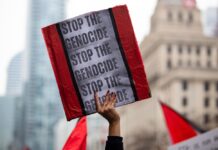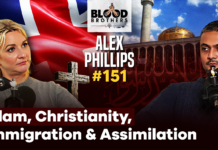The announcement that the threat level from international terrorism to Britain has been raised from substantial to severe has been greeted with some scepticism in the Muslim community.
Home Secretary Theresa May said yesterday that an attack is “highly likely”, although she said there is no evidence to suggest an attack is imminent. She added that the decision to raise the official threat level is “related to developments in Syria and Iraq, where terrorist groups are planning attacks against the West”.
The Home Secretary said some of the plots were likely to involve foreign fighters who had travelled to the Middle East from Britain and Europe to take part in the conflicts there.
The official threat level assessment last stood at “severe” more than three years ago when it was reduced to “substantial” on 11 July 2011. Severe is the fourth level in the five-tier system of alert categories that have been used by the government since 2006 to warn of terrorist activity. The only higher level is “critical”, which is used when an attack is expected imminently.
But following the announcement advocacy group CAGE said there is a campaign to demonise legitimate Islamic political thought.
In a statement CAGE said: “Recent events from the Middle East have placed the Muslim community in Britain in the public eye once more with their every word and action coming under microscopic scrutiny by the media and politicians. This is only the latest chapter in an ideological attack that has been ongoing for significantly longer.
“Whereas the attacks on Islamic concepts of war, political governance and the unity of Muslim lands are nothing new, they have now increased on an unprecedented scale in the wake of the rise of ISIS and its declaration of a Caliphate. The matter is not about supporting or opposing the version of a Caliphate as demonstrated by ISIS but rather the criminalisation of Islamic political thought and ideology.
Subscribe to our newsletter and stay updated on the latest news and updates from around the Muslim world!
“The concepts of jihad, shariah and khilafah are not the exclusive possession of ISIS but core Islamic doctrines subscribed to by almost one third’s of the world’s population. It is telling that the government’s treatment of ISIS is similar to its treatment of Hamas, the Muslim Brotherhood, Hizb-ut Tahrir, and the Taliban, despite the enormous differences of belief and methodology between the groups.
“The Islamophobic nature of the criminalisation of those who believe in fighting in Syria against Assad is underlined by the lack of concern for British Jews who fight in the Israeli Occupation Forces, particularly at times where they are engaged in war crimes and other atrocities, such as the recent attack on Gaza.
“On the flip side, Muslims who wish to aid their brothers and sisters through the provision of humanitarian aid via aid convoys are having their homes raided, being harassed by the security services and are effectively being accused of engaging in terrorism. Charities are having their bank accounts closed without explanation and are coming under investigation by the Charity Commission simply for being involved in crisis zones like Gaza and Syria.
“Witch-hunts such as the Trojan Horse hoax and the mass hysteria over issues of the niqab, halal food and conservative Muslim values demonstrate that the criminalisation is spreading beyond Middle Eastern politics.
“Individuals and organisations within the Muslim community who have been speaking out against these policies are now under attack. They have had their organisation, business and bank accounts arbitrarily closed. Even their children’s bank accounts have been closed. They are maligned in the media as terrorist sympathisers, extremists and jihadists. Some have even been imprisoned.
“The common element across all these cases is that those targeted cared for the oppressed and for those who are suffering. They have been criminalised because they cared.”





















